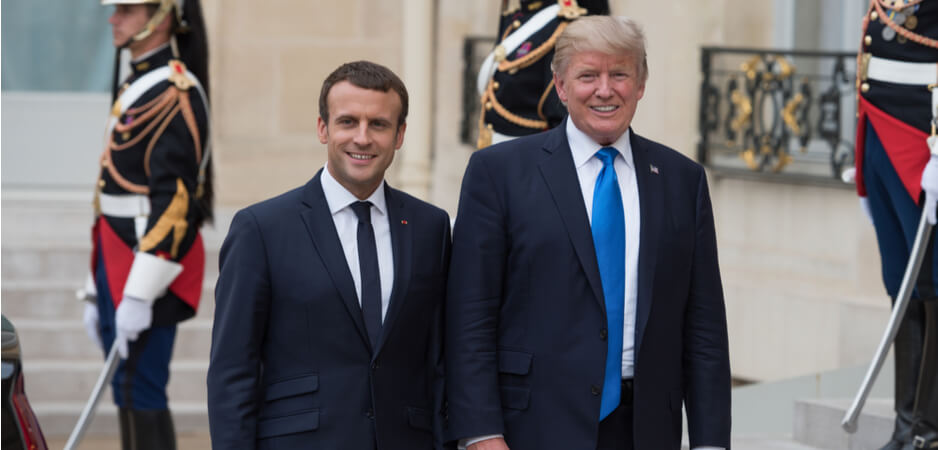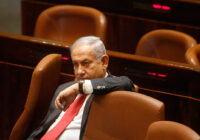Emmanuel Macron has failed to change Donald Trump’s mind on the question of the Iran nuclear deal.
The purpose of French President Emmanuel Macron’s first state visit to the US last month was explicit: salvaging the Iran nuclear deal and convincing President Donald Trump not to reimpose sanctions. On January 12, the Trump administration extended sanction relief for Iran by four months. Pressure is now on for US Congress and Europe to address what the president has called “disastrous flaws” in the deal that was agreed in 2015.
In the run-up to Macron’s visit, President Trump signaled his willingness to consider a revised nuclear deal. The American liberal press welcomed Macron’s visit and his attempt to influence Trump’s foreign policy. Days after the meeting, however, Macron and his team seem less sure than ever that the US will stick to the agreement.
Record-low approval ratings and a series of labor strikes have hit Macron’s government. On the international stage, by contrast, Macron has achieved a series of diplomatic victories since taking office. His speech on climate change (“Make the planet great again”) has established him as a central voice in European liberalism. Under Macron, France has stepped up its commitment in the Sahel and taken the lead in creating the G5, a military force tasked with pushing back Islamist movements in the Sahara.
In his dealings with Trump, Macron has managed to be critical of the American administration without alienating his American counterpart. That Macron and Trump have a seemingly cordial relationship seems surprising given their political differences and Trump’s admiration for autocratic leaders like Vladimir Putin and Xi Jinping. Yet Macron is the first international leader to be hosted at the White House for an official state visit. Macron’s encounters with Trump stand in sharp contrast with the American president’s cold interactions with German Chancellor Angela Merkel and UK Prime Minister Theresa May.
Speaking on the BBC’s Andrew Marr Show, Macron claimed he is always “extremely direct” with the American president. Despite their political differences, both Trump and Macron have built their political success by differentiating themselves from their predecessors. Trump has put his efforts into undoing Barack Obama’s foreign policy. Macron has condemned former President François Hollande’s inaction in Syria during the 2013 chemical attacks and has been equally critical of Nicolas Sarkozy’s handling of the Libyan crisis during his presidency.
The Limits of the “Special Relationship”
Despite his activism on the international stage, Macron’s ability to sway Trump is open to question. Prior to his visit, Macron suggested he had convinced Trump to maintain American military presence in Syria — a claim denied by the White House. On the question of the Iran nuclear deal, Macron has also failed to change the president’s mind.
After hours of intensive talks with the French president, Trump described the nuclear agreement as “insane” and “ridiculous.” Recent days have seen a growing momentum against the agreement. Israeli Prime Minister Benjamin Netanyahu, for example, accused Iran to be “brazenly lying” about its nuclear ambitions.
At the same time, Macron’s negotiation tactics with Trump are likely to put him at odds with his European counterparts. The members of the agreement have opposed a hypothetical “new nuclear deal” briefly taunted by Trump and have been adamant that it should be preserved as it is. Not only did Macron’s political gamble not yield results, it has also drawn criticisms that he is compromising too much with the American administration. After his three-day visit, Macron was forced to concede that Trump is likely to “get rid of the deal on his own, for domestic reasons.”
Iran is not the only illustration of the limits of Macron’s diplomacy. Macron’s involvement in the Libyan conflict has shown the difficulty of balancing diverging interests in countries affected by political conflict and instability. Months after Macron hosted talks between the Western-backed Libyan leader Fayez al-Sarraj and General Khalifa Haftar, political progress in Libya has stalled with no end to political instability in sight.
A Political Victory?
Because Macron’s negotiation with Trump has failed to achieve its goals, the trip didn’t score any political victories. Nonetheless, Macron’s diplomatic venture confirmed his ambition to fill the leadership vacuum in Europe at a time when Angela Merkel’s coalition faces difficulties in Germany and the UK grapples with the ramifications of Brexit.
Macron’s government has placed effective communication at the heart of France’s international policy. Macron’s speech on climate change made him an international celebrity, while his reception for Donald Trump and his wife Melania on Bastille Day last year was greeted as a political success by the press. During his recent visit, Macron gave a speech before Congress in English, reiterating his support for the Paris Climate Agreement and the Iran nuclear deal. While less viral than his climate change speech, Macron’s address to Congress still fulfilled a similar purpose: strengthening his international aura.
Diplomacy is one of Macron’s strengths. The French president may be facing strikes and discontent at home, but his hyperactivity abroad has earned him political points in France. While 6 out of 10 French voters disapprove of Macron’s domestic record, 63% believe that his election has had a positive impact on France’s image, according to a recent IFOP poll.
Following his election to the French presidency, Macron faced accusations of inexperience. Almost a year after taking office, he has managed to shake off his image as a newcomer on the international stage. Whether his activism will achieve substantial results and the “special relationship” with Trump will stand the test of time remains to be seen.
The views expressed in this article are the author’s own and do not necessarily reflect Fair Observer’s editorial policy.
Photo Credit: Frederic Legrand – COMEO / Shutterstock.com
Support Fair Observer
We rely on your support for our independence, diversity and quality.
For more than 10 years, Fair Observer has been free, fair and independent. No billionaire owns us, no advertisers control us. We are a reader-supported nonprofit. Unlike many other publications, we keep our content free for readers regardless of where they live or whether they can afford to pay. We have no paywalls and no ads.
In the post-truth era of fake news, echo chambers and filter bubbles, we publish a plurality of perspectives from around the world. Anyone can publish with us, but everyone goes through a rigorous editorial process. So, you get fact-checked, well-reasoned content instead of noise.
We publish 2,500+ voices from 90+ countries. We also conduct education and training programs
on subjects ranging from digital media and journalism to writing and critical thinking. This
doesn’t come cheap. Servers, editors, trainers and web developers cost
money.
Please consider supporting us on a regular basis as a recurring donor or a
sustaining member.
Will you support FO’s journalism?
We rely on your support for our independence, diversity and quality.







